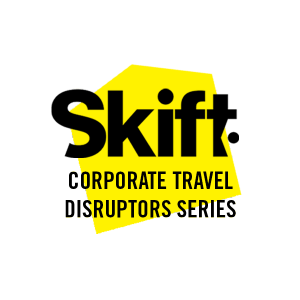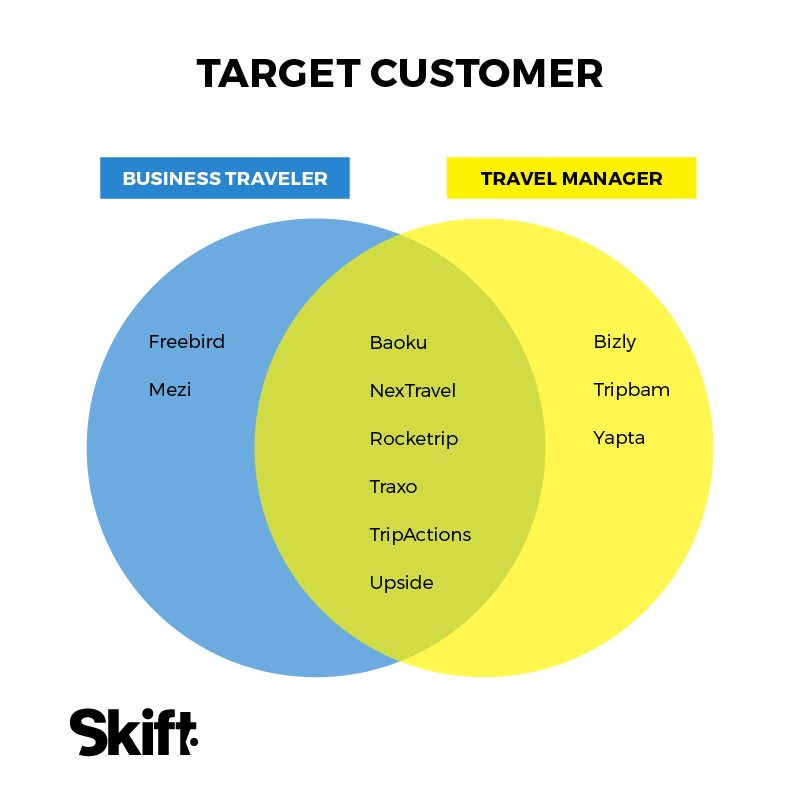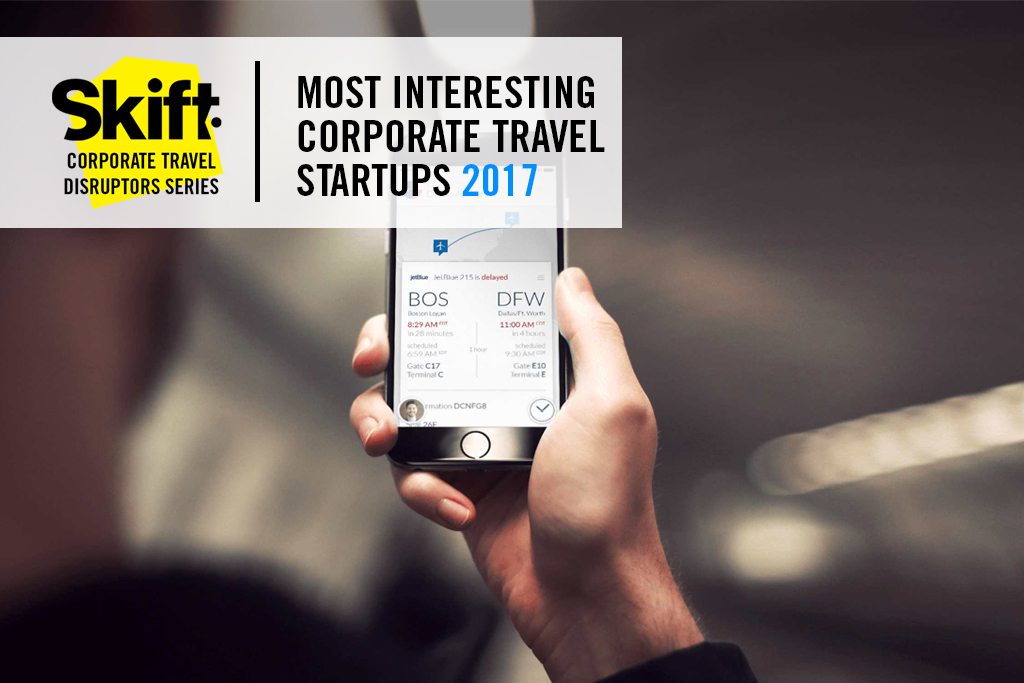Skift Take
Innovation used to be hard to come by in corporate travel. Today, these startups are doing the hard work of moving the industry forward -- and major players are paying attention.
 Editor’s Note: A year ago, Skift expanded its coverage of corporate travel with more frequent stories and a dedicated newsletter. The Corporate Travel Innovation Report focuses on the future of corporate travel by examining the big fault lines of disruption for travel managers and buyers, the innovations emerging from the sector, and the changing business traveler habits that are upending how corporate travel is packaged, bought, and sold.
Editor’s Note: A year ago, Skift expanded its coverage of corporate travel with more frequent stories and a dedicated newsletter. The Corporate Travel Innovation Report focuses on the future of corporate travel by examining the big fault lines of disruption for travel managers and buyers, the innovations emerging from the sector, and the changing business traveler habits that are upending how corporate travel is packaged, bought, and sold.
In this series of stories and one-on-one interviews, we explore some of the latest trends, technology, and external forces causing corporate travel to evolve. You can read the rest of the articles in this series here.
Subscribe to the Corporate Travel Innovation Report
The corporate travel ecosystem, historically, has been extremely resistant to change. The very nature of the business model maintained by corporate travel management companies tends to make experimentation seem risky; If you’re making money from both business travelers and travel providers, why change anything at all?
But one thing did change: Traveler behavior. Trained by consumer booking tools and other technological innovations, road warriors began taking control of their business itineraries, posing new challenges for companies looking to restrain spending, and travel management companies began losing bookings they expected to have.
The ubiquity of smartphones and mobile booking have accelerated the need for change in corporate travel, since many travelers simply would prefer not to have to phone a corporate travel agent to book a trip.
Today, travel management companies and travel technology companies are looking to crack the myriad problems in corporate travel; many are starting with making life easier for business travelers themselves and giving them a reason to book travel in policy.
Skift took stock of the wide array of startups touching corporate travel and following are the startups that Skift has selected as having the greatest potential for disruption in the corporate travel ecosystem.
Many, like Rocketrip and Traxo, have already partnered with major travel management companies, and some, like Upside, provide solutions for companies to completely bypass using them at all. Others look to streamline elements of business travel, ranging from meetings management to personal shopping.
These startups were selected on the virtues of offering unique solutions to corporate travel challenges, having industry-leading positions in the field, and helping to push forward the innovation that is desperately needed across corporate travel. Many startups didn’t make the list, often because their product offerings echo too strongly those of other startups that are more established.

Skift’s Most Interesting Corporate Travel Startups 2017
The following companies are presented in alphabetical order.
Baoku
Beijing, China
Business travel tools, by China and for China
China is now the biggest business travel market in the world, making it ripe for corporate travel solutions that fit the country’s unique needs. Enter Baoku, which provides a Web-based platform for travel booking and expense tracking geared toward the Chinese business travel market.
Baoku has raised $10 million in two rounds of funding.
Bizly
New York, N.Y.
Corporate events done quickly
Planning business meetings and events can be extremely costly and time-consuming. Bizly looks to ease many pain points by allowing users to set the parameters of an event on mobile, chat with professional meeting planners, and quickly book a meeting space.
Bizly raised $1.6 million in seed funding in 2016, and is looking to further develop its product offerings in 2017.
Freebird
Cambridge, Mass.
Smarter flight insurance and rebooking
Freebird takes an intuitive approach to flight insurance and rebooking. Pay $19 one-way or $34 round-trip and if your flight is disrupted, you can rebook your flight on your mobile phone with no additional cost. This is available on any airline at any time, unlike other flight insurance products sold by more established insurance firms.
Freebird raised $3.5 million in seed funding in 2015, and is gaining traction among smaller travel programs.
Mezi
San Francisco, Calif.
A digital travel planner and personal shopper
For serious road warriors, time is a precious commodity. Mezi combines a digital travel concierge with a personal shopping assistant, allowing users to book travel or buy anything via text.
Mezi has raised $11.8 million in two funding rounds and is exploring the opportunity for artificial intelligence and automation to serve both the travel and shopping needs of business travelers.
NexTravel
New York, N.Y.
Easier business travel booking and rebooking
NexTravel is a corporate booking tool with the goal of making it easy for companies to sign up and determine a travel policy. The booking process is also streamlined, eliminating many of the headaches that stem from using a complex booking tool.
Rocketrip
New York, N.Y.
Rewarding travelers for making smart travel decisions
Telling business travelers what to do is no longer a sustainable option, now that they’ve been trained as consumers to book trips themselves. Rocketrip incentives travelers to make cheaper travel buying decisions, and rewards them with gift cards they can spend on whatever they want. The company raised $9 million in Series B funding in 2016, bringing its total funding to $17.1 million.
CEO Dan Ruch told Skift last year that companies can no longer ignore what travelers want in order to save a few bucks.
Traxo
Dallas, Texas
A flexible platform for business travel tracking
So-called “leakage” remains a huge concern for travel managers. Since travelers are empowered with consumer tools, quite often those who book travel themselves end up with elements of their trip missing from their corporate itinerary management tools. This can have serious ramifications for safety, security, and savings.
Traxo, which has raised $10.94 million in three funding rounds, aggregates travel information like bookings and loyalty points using an API and email parsing to ensure all the details of a traveler’s journey are captured.
“The point is, now, who needs that 360-degree view of the traveler?” asked Traxo founder Andres Fabris in 2016. “Well, a lot of people. The traveler wants it for themselves. The corporate travel manager does, and then some of the travel companies do as well.”
TripActions
Menlo Park, Calif.
Incentives and sleek booking tool all-in-one
TripActions offers a sleek mobile booking tool to capture bookings and provide service via chat for business travelers at small and medium-size businesses. Closer to Upside than Rocketrip, TripActions has raised $14.7 million in two funding rounds and is aiming to position itself as a more user-friendly Concur.
Tripbam
Dallas, Texas
Hotel tracking and intelligence
Tripbam is an intelligent platform for tracking hotel rates and rebooking at a lower rate. By constantly monitoring rate shifts, it can automatically drive down hotel costs for business travelers. It will also automatically convert bookings made outside of corporate travel policy to bookings for similar hotels nearby.
“When it comes to hotels, because it’s so screwed up, I think there’s a real opportunity for travel managers to make a difference, but they’re just struggling,” said Tripbam CEO Steve Reynolds. “They’re struggling with lack of data, lack of systems, lack of process, lack of consistency.”
Upside
Washington, D.C.
Travel management for Small and Mid-Size Businesses
When travel legend Jay Walker speaks, the rest of the travel industry listens. Upside, Walker’s newest travel company, seeks to reward travelers gift cards for booking cheaper itineraries. The company negotiates packages with suppliers, and since the price of individual elements of the combined bookings are never disclosed, Upside is able to offer more inexpensive options to travelers.
Upside has raised $50 million in its first funding round, and will continue to market itself to small and medium-sized businesses without existing managed travel programs.
“We’re going straight for the unmanaged business traveler,” said Walker when the company was announced. “A lot of the time when I talk to small companies, [they say] they’re not even as interested in saving money, but if they could just give their employees a benefit for business travel, they love that idea.”
Yapta
Seattle, Wash.
Automated tracking of airfares and hotel rates
Why track hotel rates and airfares as they fluctuate when you can have Yapta monitor your bookings and automatically rebook you when prices drop? By automating a process that is time-consuming for travel managers, Yapta helps companies make smarter buying decisions without wasting time that could be better spent on other things.
Yapta has raised $24.21 million in nine rounds since it was founded in 2007, when it began as a consumer site. It recently announced a deal with American Express Global Business Travel to bring its technology to a new air re-booking tool.
The Daily Newsletter
Our daily coverage of the global travel industry. Written by editors and analysts from across Skift’s brands.
Have a confidential tip for Skift? Get in touch
Tags: business travel, corpdisrupt, startups
